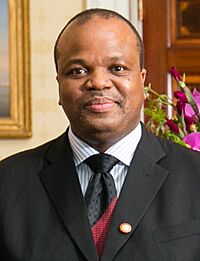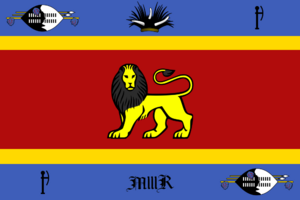Ngwenyama facts for kids
Quick facts for kids iNgwenyama of Eswatini |
|
|---|---|

Arms of His Majesty the iNgwenyama of Eswatini
|
|
| Incumbent | |
 |
|
| Mswati III since 25 April 1986 |
|
| Details | |
| Style | His Majesty |
| Heir apparent | None declared |
| First monarch | Mkhulunkosi |
| Residence | Lozitha Palace, Lobamba, Eswatini |
The iNgwenyama is the title for the male ruler of Eswatini, a country in Southern Africa. It means "Lion" in the Swazi language. In English, people often call him the King of Eswatini.
The iNgwenyama rules alongside the Ndlovukati, who is usually the King's mother or another important female royal. The Ndlovukati holds a special spiritual leadership role.
The current King is Mswati III. He has been the iNgwenyama since April 25, 1986.
Contents
What Does iNgwenyama Mean?
The word iNgwenyama means "Lion" in the Swazi language. However, it's used as a respectful title, like calling someone a great leader. It's different from the word libhubesi, which is used for an actual lion animal.
The "i-" at the beginning of "iNgwenyama" means "the king." When you talk about more than one king, you use "ti-" at the start, making it tiNgwenyama.
How the King Rules
Economic Power
The iNgwenyama owns most of the valuable minerals found in Eswatini. This means he controls how these minerals are dug up and used. Only minerals owned by private companies are not under his control.
Government Role
The iNgwenyama has a big role in the government of Eswatini. He can choose 20 people to be senators in the Senate of Eswatini. He also picks 10 members for the House of Assembly of Eswatini.
The King is also in charge of the country's court system. He leads the Swazi National Council, which is an important traditional group. Many local leaders in Eswatini are chosen by the iNgwenyama or by people he has appointed.
Cultural Influence
The iNgwenyama has many important cultural duties. He can decide how land is given out to people. He also starts national gatherings and organizes big social events. The King takes part in special traditional ceremonies.
The King has special singers called griots. These griots sing praises about the iNgwenyama at public events. It is considered a very serious offense to harm the King, the Ndlovukati, or their property. There are also rules about not wearing the King's clothes or using his special medicines. It is also against the law to get too close to the King or Ndlovukati. The iNgwenyama can even ask any citizen to leave the country for a good reason.
Religious Importance
The iNgwenyama plays a key role in the annual Incwala festival. This festival is very important for the country's well-being. During the Incwala, the King performs a ritual with sacred water. This act marks the end of the old year.
On the second day of the festival, young people gather special tree branches. They place these branches in a sacred place. The iNgwenyama then sings with his people in this special area. This singing shows everyone's loyalty to the King. Later, the King lights a special fire. The main goal of the Incwala festival is to make sure Eswatini has a good and successful year ahead. Some people also believe the iNgwenyama can influence when it rains.
History of the Monarchy
Sobhuza II was a very important iNgwenyama. He helped Eswatini become more modern. For a long time, a group called the Imbokodvo National Movement won most of the government seats. This gave them a lot of control when political parties were allowed.
King Mswati III has also made changes to the traditional system of government. He has updated parts of the old system with new institutions for modern Eswatini.
How a New King is Chosen
The iNgwenyama is traditionally followed by one of his male sons. The choice of which son will become the next King depends on the good qualities of his mother.
See also
 In Spanish: Ngwenyama para niños
In Spanish: Ngwenyama para niños
 | Janet Taylor Pickett |
 | Synthia Saint James |
 | Howardena Pindell |
 | Faith Ringgold |


